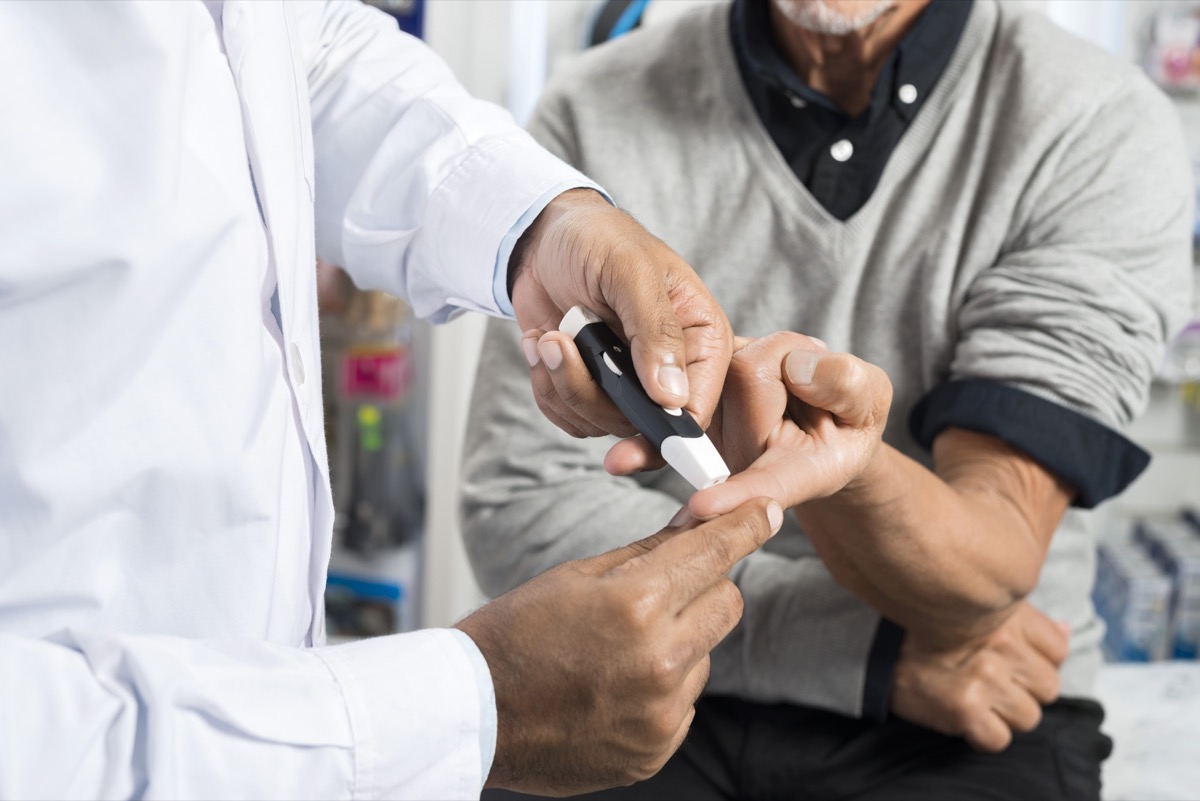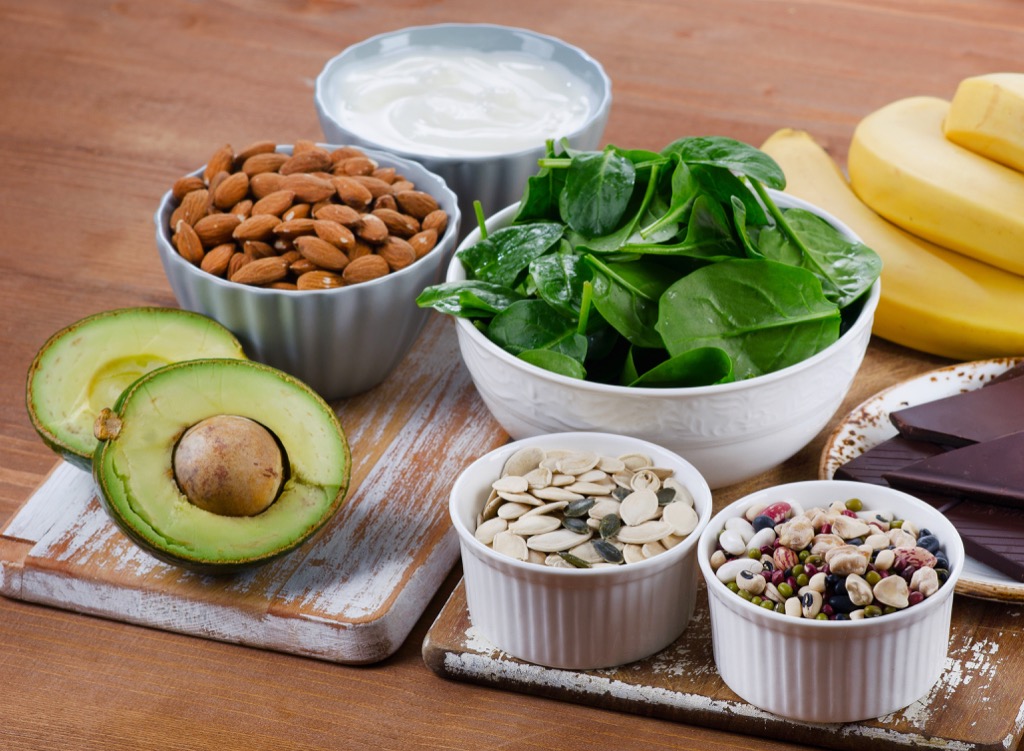According to data from the American Heart Association, 6 percent of men and 5.5 percent of women between the ages of 40 and 59 have coronary heart disease (CHD). Among those 60 to 79 years old, those numbers at least double: 21.1 percent of men and 10.6 percent of women in that age bracket have CHD. And, as the U.K.’s National Health Service (NHS) notes, CHD is the leading cause of heart attacks. If you want to avoid becoming a statistic, there’s still plenty of time to ditch the habits that increase your heart attack risk after 40. Make changes today, so that you can have many healthy years to look forward to. RELATED: 20 Ways You Didn’t Realize You’re Ruining Your Heart. Starting the day off right with a healthy breakfast could ultimately save your life. A review of research published in the journal Circulation in 2013 found a significant link between eating breakfast and a reduced risk of coronary heart disease. RELATED: If You Notice This While Walking, It Could Be a Heart Attack Warning Sign. Your oral health and your heart health are more connected than you think. According to a 2016 study published in the BMJ Postgraduate Medical Journal, oral bacteria can contribute to a person’s risk of atherosclerosis, or hardening and narrowing of the arteries, which can significantly increase the likelihood of a heart attack. A glass of red wine once in a while might have some heart health benefits, but regular drinking can put you at risk of a heart attack. “Too much alcohol can increase blood pressure and triglycerides, which can increase your risk of heart disease,” says Seema Sarin, MD, of EHE Health. Her recommendation? “Women should have no more than one drink a day. Men should have no more than two drinks a day.” Having friends is not only important to your happiness, but the friendships you make may actually help your heart in the long run. According to a 2016 study published in the journal Heart, social isolation can significantly increase a person’s risk of developing heart disease. Those who reported poor social relationships had a 29 percent greater chance of having CHD than those with healthier ones. Want a healthier heart? Try switching from the night shift to a nine to five schedule, if possible. Research published in the Journal of the American Medical Association (JAMA) in 2016 discovered a link between long-duration night shift work and an increased risk of CHD among women. If you want to strengthen your heart health, consider commuting by bike whenever possible. Significant research published in the journal Archives of Internal Medicine in 2009 proved that individuals who commuted to work by bike or foot had a reduced likelihood of obesity and lower blood pressure—which means a decreased heart attack risk. There’s no time like the present to spring for a treadmill desk if you’re eager to reduce your heart attack risk. A 2012 study published in the journal Diabetology found that a sedentary job increased an individual’s chance of experiencing a cardiovascular event by 147 percent. While skimping on sleep is bad for your wellbeing, getting too much sleep can actually be worse for your heart health than not getting enough. A meta-analysis of research published in the Journal of the American Heart Association in 2018 revealed that getting more than eight hours of sleep can significantly increase a person’s risk of cardiovascular disease (CVD), with a moderate risk for those who got nine hours of sleep and nearly a 44 percent increase among those logging eleven hours a night. It might not be the best medicine, but the benefits of laughter can’t be discounted. A pivotal 2009 study published in the journal Nature found that laughing expands the inner lining of blood vessels and increases blood flow, which improves your heart health and ultimately decreases your heart attack risk. RELATED: If You Notice This on Your Legs, Have Your Heart Checked, Says Mayo Clinic. A little green space can do your heart a world of good. A review of research published in Current Epidemiology Reports in 2015 found that exposure to nature not only improves mental health, but it can also improve a person’s cardiovascular health. According to the researchers, “higher levels of greenness were associated with lower risk of CVD, ischemic heart disease, and stroke mortality.” Getting the flu will do more than just eat up your sick days—it could contribute to your risk of a potentially fatal cardiovascular event. According to a 2018 study published in The New England Journal of Medicine, within the first seven days of a confirmed flu diagnosis, patients have a significantly increased risk of heart attack. All the more reason to get your flu shot! Time to cue up the Marvin Gaye and break out a good bottle of wine—for your heart health, of course. As it turns out, not having regular sex could be contributing to your heart disease risk. A review of research published in the American Journal of Cardiology in 2010 found that having sex once a month or less increased a person’s risk of cardiovascular disease, and thus, cardiovascular events. If you’re over 40, it’s time to make sure you’re monitoring your blood sugar, especially if you have a family history of diabetes or risk factors like obesity, high blood pressure, or a sedentary lifestyle. “Sugars build up in the blood and increase your risk of heart disease,” says Sarin. “Having a healthy diet, exercising regularly, eating whole food plant-based nutrition can all help to lower your blood sugar levels.” Skipping the gym one too many times could be a big problem for your heart down the road. “Physical inactivity is a risk factor for heart disease,” says Sarin. She notes that exercise can help lower your blood pressure, cholesterol, weight, and even stress levels, which decreases your likelihood of a heart attack. So, how much time should you be spending at the gym? According to the experts, 30 minutes of moderate activity a day—or 150 minutes a week—will reduce your heart disease risk. However, that doesn’t mean you should overdo it to the point of exhaustion or pain. Because if you do, your heart could also pay the price. “Lasting stress on the heart can lead to something called ‘athletic heart syndrome,’” says clinical nutritionist and fitness expert Ariane Hundt, MS. “Your heart becomes enlarged in order to keep up with the stress placed on it. It can also lead to an increase in your body’s stress response—high cortisol and adrenaline—and result in irregular heartbeat.” From bad relationships to long hours at work, your daily stressors could have serious implications in terms of your heart health. “Stress that goes unmanaged and lasts for extended periods results in increased cortisol levels and leads to an inflamed system,” Hundt says. She adds that “long-term stress suppresses the immune system and allows [heart] disease to occur.” If there’s any way to get out from under a terrible boss, your heart will thank you. The dynamic of an overbearing manager who’s always on your back for one thing or another might be doing more than just leaving you frustrated and irritable at the end of the day. The results of an oft-cited 2009 Swedish study published in the journal Occupational and Environmental Medicine found that people with uncommunicative, secretive, inconsiderate, and incompetent bosses increased their risk of having a severe cardiovascular event by 60 percent. We’ve all been guilty of losing our temper from time to time, but it’s in the best interest of your heart to try to manage how often you’re losing your cool. Regular feelings of anger have been linked to an increased heart attack risk, according to a 2015 study published in the European Heart Journal. The researchers behind the study found that episodes of intense anger were directly linked to a greater risk of acute heart occlusion, which obstructs blood flow to the heart. Addressing your depressive symptoms is the first step toward a healthier heart. According to research published in Psychosomatic Medicine in 2014, early treatment for depression can cut a person’s risk of cardiovascular events in half. So if you’re feeling blue, there’s no time like the present to seek treatment to improve your mental health. If you’re not sipping water throughout the day, you could be setting yourself up for heart problems after 40. Research published in a 2017 issue of the European Journal of Nutrition found that even minor dehydration can increase a person’s risk of CVD. If your last blood pressure reading was higher than normal, do everything in your power to decrease those numbers—or you could be staring down a heart attack in the future. “A healthy diet, reducing stress, decreasing salt intake, and exercising regularly can reduce your blood pressure,” according to Sarin. In turn, you’ll also decrease your heart attack risk Ignoring high cholesterol levels now may mean setting yourself up for serious heart trouble down the line. According to family and emergency medicine doctor Janette Nesheiwat, MD, high cholesterol is one of the biggest contributing factors to your risk of heart disease. “If you smoke, quit now,” says David Greuner, MD, of NYC Surgical Associates. Smoking significantly increases an individual’s risk of heart disease, as well as their risk of high blood pressure, diabetes, and stroke. And if you’re trying to quit smoking, make sure you’re not using nicotine-based smoking cessation products longer than necessary. “Nicotine raises blood pressure, which is another risk factor for heart disease,” says Sarin. A cup of coffee from time to time likely won’t hurt you, but over-reliance on caffeine can increase your heart attack risk. “Excessive caffeine consumption … contributes to stress in the body,” which can lead to a higher likelihood of heart disease, according to Hundt. RELATED: If You Have This iPhone, Your Heart Could Be At Risk, FDA Warns. Think opting for diet soda instead of the sugary regular version is the healthier choice for your heart? Not necessarily. According to 2012 research published in the Journal of General Internal Medicine, even among individuals without other risk factors, regular consumption of diet drinks increases your risk of heart disease. There are plenty of health benefits to controlling your diet, but yo-yo dieting may do more harm than good. Research presented at the American Heart Association (AHA) convention in 2019 showed that women who had at least one incidence of yo-yo dieting—in which they lost 10 pounds and gained it back within a year—were 65 percent less likely to have an overall “optimal” rating on AHA’s Life’s Simple 7, which measures how under control one’s heart disease risk factors are. Cooking your food thoroughly is essential to prevent food poisoning, but blackening your meat or fish—a popular (and delicious) barbecue technique—isn’t doing your heart any favors. “Eating a diet high in inflammatory foods is a big risk factor,” says Hundt. “Fatty cuts of meat that are grilled until they’re charcoal increases [cardiovascular disease] risk.” You may have been able to get away with fried food at 20, but at 40, those greasy snacks are not making your heart happy. Even eating fried chicken just once a week increased a person’s risk of heart disease by 12 percent, according to a 2019 study published in the British Medical Journal. If you want to decrease your heart attack risk, start by weaning yourself off the sugar in your diet. “Eating a diet high in sugar and processed foods increases insulin and in turn inflammation, which creates damage to the arteries,” says Hundt. “The resulting increase in cholesterol is then used to patch up the arterial damage. Over time, this buildup of plaque leads to a narrowing of the arteries,” contributing to your chances of a heart attack. Reducing your consumption of animal products in favor of fruits, vegetables, and plant-based proteins is a great way to start strengthening your heart health. “Saturated fats, trans fats, and cholesterol can contribute to heart disease,” says Sarin. “Eating a plant-based, whole food diet has been shown to decrease the risk of heart disease in many studies. It also helps lower your cholesterol and LDL levels, which decreases your risk of heart disease as well.” Those regular refined carbohydrates and steak dinners are likely hurting your heart. If you want to avoid a heart attack after 40, “eat a well-balanced, high-fiber diet,” says Nesheiwat. “A lack of omega-3 fatty acids is a major contributor to heart disease,” according to Hundt. The key nutrients provided by fish oils can be incorporated into your diet by consuming certain types of seafood, or in dietary supplements you can buy at any drug store. However you consume them is your choice, but just make sure you are getting enough of the fatty acids in your diet. For more helpful health information sent straight to your inbox, sign up for our daily newsletter. Like omega-3, omega-6 is a fatty acid, but generally speaking, people consume much more of it than they should, throwing off what should be a healthy balance of the two essential acids. “It is important to have a healthy balance between omega-6 and omega-3 fatty acids,” says Jessica Wilhelm, CN, clinical team director of Wellnicity. “The ratio between omega-6 and omega-3 should be between 4:1 and 2:1. However, the standard American diet contains up to a 20:1 ratio, meaning we consume up to 20 times more omega-6s than omega-3s.” To know what you should steer clear of for the sake of your heart health, omega-6 fatty acids are found in things like corn and vegetable oil. “Magnesium is a mineral involved in over 300 different metabolic processes in the body that are critical for cardiac health,” says Wilhelm. “Having adequate levels of magnesium is associated with a lower risk for cardiovascular disease, but can also support healthy blood pressure because of its smooth muscle relaxing properties.“ae0fcc31ae342fd3a1346ebb1f342fcb So, how do you know if you’re deficient? “Anxiety, fatigue, muscle cramps, stiffness, and twitching are all signs that you’re not getting enough magnesium in your diet,” according to Wilhelm. CoQ10 acts as an antioxidant that plays an important part in your metabolism. But, according to Wilhelm, “depletion of this heart-healthy nutrient can occur when taking blood pressure medications classified as beta blockers and statin medication to lower cholesterol.” Fortunately, supplementation and eating foods like fatty fish, oranges, strawberries, lentils, peanuts, spinach, cauliflower, and broccoli can increase your levels of this important nutrient that keeps your heart free of disease, reducing your heart attack risk in the long run. If you have a choice between living at the beach or in the mountains in your 40s, choose the latter—your heart will be grateful. According to a 2017 study published in the journal Frontiers in Physiology, lower-altitude living is associated with a greater risk of metabolic syndrome, which can contribute to heart disease. Your family history shapes who you are, including your risk of a heart attack. According to research published in the journal Circulation in 2012, men with a family history of heart disease had about a 50 percent increased risk of developing cardiovascular issues themselves. Luckily, having this information and controlling other risk factors, like diet and activity level, can help you live a longer, healthier life. There’s no time like the present to lose those extra pounds, especially if you’re already at a higher risk of cardiovascular disease than normal. “Obesity is linked to heart disease, a higher LDL, triglycerides, and lower HDL, which are all risk factors for heart disease,” says Sarin. While bailing on a lackluster marriage may be good for you in the long run, the stress brought on by getting a divorce after 40 could increase your risk of heart disease, according to a 2017 study published in the journal Cardiology Research and Practice. The study revealed that women who had gone through a divorce ran an increased risk of serious heart conditions. If they went through multiple divorces, the increase in their risk of heart disease became even more significant. (Curiously, the same connection between divorce and heart disease was not found in men, the study determined.) RELATED: If Your Legs Feel Like This, Have Your Heart Checked, Says Mayo Clinic.





































